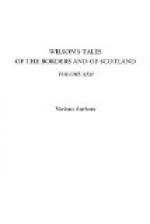as to how to divide his means. Nor could he reconcile
himself to a division at all, preferring, as the greatly
lesser evil, the alternative of destinating his fortune
all of a lump, with some hope of its being kept together.
As for Walter, though he had some affection for him,
he had not much confidence in him, for he had seen
that he was hare-brained as regarded things which
suited his fancy, and pig-brained as respected those
which solicited and required sound judgment; while
Rachel, again, was everything which, among the lower
angels, could be comprehended under the delightful
title of “dear soul,” an amiable and devoted
creature, as stedfast in her affections as she was
wise in the selection of their objects. So by
revolving in his mind all the beauties of the character
of her who, however disqualified by law, was still
of his flesh and blood, yea, of his very nature, as
he complacently thought in compliment to himself,
he became more and more reconciled to his intention,
if the very thought of making a will, which had been
horrible to him, did not become even a pleasing kind
of meditation. So is it—when Nature
imposes an inevitable duty, she gives man the power
of inventing a pleasing reason for his obedience;
nay, so much of a self-dissembler is he, that he even
cheats himself into the belief that his obedience is
an act of his own will. In all which he at least
proved the value of one of the arguments in favour
of marriage; for trite it is to say, a bachelor bears
to no one a love which reconciles him to will-making,
while a father, in leaving his means to his children,
feels as if he were giving to himself. But this
plan of our merchant-burgess had in addition a spice
of ingenuity in it which still more pleased him—he
would so contrive matters that the daughter and the
nephew would become, after his death, man and wife.
He had only some doubts how far their tastes agreed,—probably
an absurd condition, in so much as we all know that
love is often struck out by opposition, and that there
is a pleasant suitability in a husband preferring
the head of a herring, and the wife the tail.
Having thus arrived at a sense of his duty by the
pleasant path of his affection, Mr. David Grierson
seized the first opportunity which presented itself
of sounding the heart of Rachel, in order to know in
what direction her affections ran. Sitting in
his big chair, all so comfortably cushioned by the
hands of the said Rachel herself, and with a good
fire alongside, due also to her unremitting care, he
called her to him, and placing his arm round her waist,
as he was often in the habit of doing, said to her—
“Rachel, dear, I feel day by day my strength
leaving me, and it may be, nay, will be, that I will
not be very much longer with you.”
Rachel looked at him for a little, but said nothing,
for, as the saying goes, her heart came to her mouth,
and she could not have spoken even if she would; but
the father understood all this, and preferred the mute
expression of a real grief to a hysterical burst—of
which, indeed, her calm genial nature was incapable.




